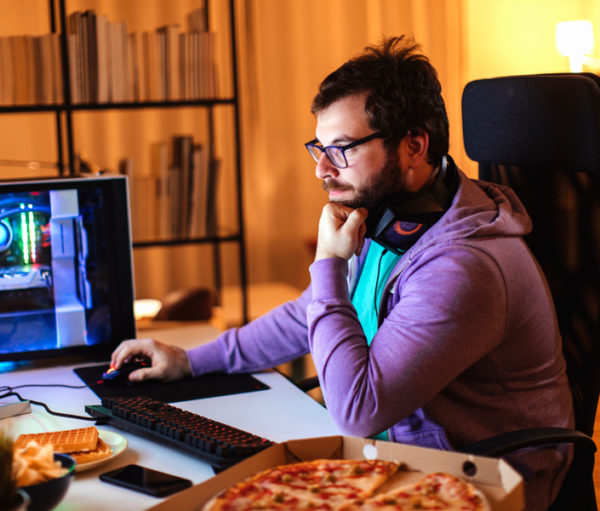Avoiding the “Quarantine 15”

We’re now three months into social distancing during the coronavirus pandemic. Under the advice of local health departments, some of us are venturing out of our homes a bit more—and noticing that when we swap our jammies and sweatpants for our regular clothes, we’re having trouble zipping up our jeans!
Many people are joking about the “Quarantine 15”—a play on the old term “Freshman 15” that refers to the dorm food weight gain of first-year college students. In our lives today, habit changes are also combining to help us pack on the pounds. For instance:
- Many of our usual exercise opportunities have been off limits, with gyms shuttered and popular walking paths closed to avoid overcrowding.
- People who can telecommute are often hunkered down in close proximity to their refrigerator. Rather than logging a few extra steps each day walking to the bus or from the parking lot, they stumble out of bed to the computer … on a collision course with the cookie jar.
- Many people, especially seniors at higher risk, have avoided going to the grocery store. So it has been challenging to keep a steady supply of nutritious, fresh produce and other healthy, but perishable, foods on hand.
- Essential workers, including those who work in senior care, are very busy, and report having less time to prepare nutritious meals. And who could resist the delicious doughnuts and pizza often dropped off by supportive members of the community?
- Many of us feel lethargic in response to a constant diet of upsetting news. And we’re feeling a lot of stress. Yes, stress can take away our appetite—but “stress eating” is definitely a thing, as well! Studies show that when we’re stressed out, we tend to choose foods that are higher in sugar and fat.
- Many of us are ordering take-out or delivered food from restaurants. A 2020 study from the Friedman School of Nutrition Science and Policy at Tufts University showed that restaurant food, fast food in particular, tends to be high in calories, and low in whole grains, fruits and vegetables that support a healthy weight.
- Sleep problems are common. Many studies show that poor quality sleep leads to weight gain. Today worrying, lack of exercise, and disorientation from our disrupted schedule can all combine to make it hard to go to sleep and stay asleep.
- Many people admit they’ve upped their alcohol intake. They’re self-medicating with more drinks than usual—and beyond other health problems this overindulgence can cause, alcohol has a lot of empty calories.
Here are some tips for keeping ourselves safe while also maintaining a healthy weight.
- Develop a home exercise routine. And learn which out-of-the-home physical activities are safe at this time. For most of us, exercising outside, safely distanced from others, is OK and recommended
- Make a shopping list, and stick to it. If you’re having groceries delivered, this might actually be easier than usual. But if you are trying to social distance at the grocery store, wearing a mask and likely dealing with one-way aisles, it can be a little harder to find everything.
- If you order takeout food, ask if the restaurant has a nutrition facts handout. This information also might be on their website. Just seeing how many calories are in that plate of nachos can help us avoid overeating—or make a healthier choice.
- Practice portion control. Nutrition experts talk about “portion distortion”—the steady creep upwards of serving sizes, especially in restaurants. In many cases, we can split that entrée into two meals and still be getting plenty of food.
- If you’re experiencing depression, anxiety or sleep problems, talk to your doctor. Most health care providers are seeing patients at this time, perhaps through telemedicine.
- Enlist the kids! If you have school-age kids, this is a great time to homeschool them on nutrition—and you might learn something yourself in the process.
Above all, say many experts, don’t worry too much if you’re gaining a few pounds. There will be plenty of time in the future to get back to exercise class and get back on track with your healthy eating habits. Stressing out too much about the Quarantine 15 might trigger a cycle that makes you gain even more weight!
At Alden, we continue to take steps to keep our residents and patients safe while providing nutritious meals and snacks, and opportunities for exercise. We’re getting through this challenging time together!
Source: IlluminAge
The information in this article is not intended to replace the advice of your health care provider. If you have questions about nutrition, exercise or safe practices during the pandemic, consult your doctor.


